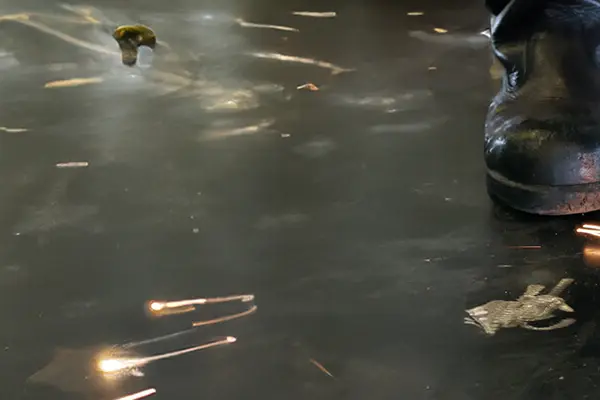
Welding personnel
To ensure safe and quality-assured welding

Welding personnel
To ensure safe and quality-assured welding
SS-EN ISO 14732
– Certification of operators and setters for mechanized and automated welding
To ensure safe and quality-assured welding, operators and setters working with fully mechanized and automated welding of metallic materials must be certified according to SS-EN ISO 14732. This international standard specifies requirements for the qualification of welding operators and machine setters for both mechanized and automated welding.
The standard regulates certification requirements for:
- Welding operators – individuals who handle and monitor mechanized and automated welding.
- Machine setters – individuals who program and set up mechanized and automated welding equipment.
The standard does not apply to personnel who merely place or remove workpieces in an automatic welding station without actively controlling the welding process.
Initial certification and certification process for welding operators and machine setters
During initial certification, welding is supervised by a welding inspector from DEKRA Industrial AB.
The certificate is personal and valid for:
- Three years, with the possibility of renewal.
- Six years, after which recertification is required.
To maintain validity, the operator/machine setter must:
- Continuously work within their certified area.
- Have their competence verified every six months by an employer-designated responsible person through a signature.
Certification procedure
Certification is conducted through a supervised test where the operator/machine setter must:
1. Follow a welding procedure specification (WPS or pWPS) developed according to the appropriate standard.
2. Demonstrate knowledge of the welding station’s functionality.
3. Work independently and ensure that all settings and parameters remain within specified limits.
4. After completing the welding process, clean the weld from oxides, spatter, and other impurities using appropriate equipment.
2. Demonstrate knowledge of the welding station’s functionality.
3. Work independently and ensure that all settings and parameters remain within specified limits.
4. After completing the welding process, clean the weld from oxides, spatter, and other impurities using appropriate equipment.
A knowledge test on the welding station’s functionality is a mandatory requirement. The operator/machine setter must be able to describe the equipment and answer oral questions according to Annex A, SS-EN ISO 14732.
Preparation for supervised certification
Before the certification test, the following documentation must be prepared:
Before the certification test, the following documentation must be prepared:
✔ Welding data sheet (pWPS/WPS) – to be reviewed in advance.
✔ Material certificate for base material – at least 3.1 inspection certificate (exceptions for material groups 1.1 and 8.1).
✔ Knowledge test (theory test) – can be conducted during certification but is not mandatory.
✔ Material certificate for base material – at least 3.1 inspection certificate (exceptions for material groups 1.1 and 8.1).
✔ Knowledge test (theory test) – can be conducted during certification but is not mandatory.
Approval can be achieved through one of the following methods:
a) Qualification based on a welding procedure test according to the relevant part of ISO 15614.
b) Qualification based on a pre-production welding test according to ISO 15613.
c) Qualification based on a test piece according to the relevant part of ISO 9606.
d) Qualification based on a production test or examination of a production sample.
b) Qualification based on a pre-production welding test according to ISO 15613.
c) Qualification based on a test piece according to the relevant part of ISO 9606.
d) Qualification based on a production test or examination of a production sample.
A knowledge test on the welding station’s functionality is mandatory, while a theoretical knowledge test in welding technology is optional.
After welding is completed, the details must undergo testing in accordance with applicable standards, depending on which of the above methods was used in the supervised test.
Once all documentation has been reviewed and meets the requirements, a certificate is issued, also known as a welder qualification certificate – commonly referred to as a “welding license”.
Certificate validity and renewal
The certificate is personal and valid for:
- Three years (renewable after three years).
- Six years (recertification required).
To renew the certificate, the operator/machine setter must demonstrate that they have worked continuously within their certified area. This must be verified every six months.
For a three-year renewal, the following conditions must be met:
- All documentation must be traceable to the operator/machine setter and the WPS used. The welding must reflect the original test conditions.
- Evidence used for renewal must be volumetric (radiographic or ultrasonic testing) or mechanical testing (bend or fracture testing) performed on two welds within the past six months.
- Acceptance levels for discontinuities or shape deviations must comply with the applicable standards.
- If the certificate expires, a new certification with a supervised test is required.
DEKRA – certification and expert support
With over fifty welding inspectors across Sweden, we are always close at hand for certification.
DEKRA Industrial AB is an accredited certification body according to ISO/IEC 17024. DEKRA Industrial AB can also assess certification as a Notified Body (No. 0640) under PED/2014/68/EU, Annex 1, Section 3.1.2.
Certification decisions by DEKRA Industrial can be appealed, and complaints may also be submitted to the certification body's management. Appeals must be made in writing.